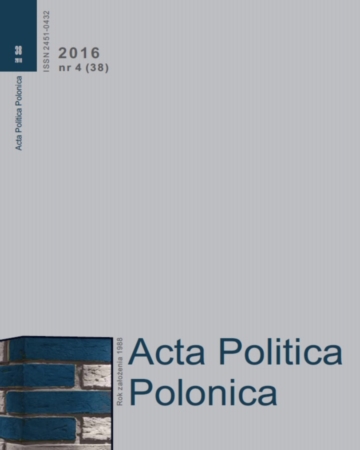
ISSN: 2451-0432
OAI
DOI: 10.18276/ap.2016.38-06





Issue archive /
4/2016 (38)
Stanowisko reprezentantów Szkoły Austriackiej wobec działalności politycznej amerykańskich Republikanów w kwestiach ekonomicznych i wolności jednostek w II połowie XIX wieku
(The Position of Representatives of the Austrian School towards the Political Activity of the American Republicans concerning Economic Issues and Individual Liberties in the Second Half of the 19th Century)
| Authors: |
Wojciech
Szabaciuk
Instytut Politologii, Uniwersytet Wrocławski |
| Keywords: | Austrian School Republican Party United States of America |
| Data publikacji całości: | 2016 |
| Page range: | 8 (81-88) |
Abstract
This article is an attempt to analyse and interpret the position of the representatives of the Austrian School towards the political activity of politicians associated with the US Republican Party in the second half of the 19th century. This article proves that in the opinion of the representatives of the one of the most radical and uncompromising social and economic science school the US Republican Party was a political group which supported centralisation of power, mercantilism, subsidies for big business and realisation of the model of state which would be compatible with their religious beliefs. The author shows that the Republican president Abraham Lincoln was critically perceived by adherents of the Austrian School, who accused him of limiting liberties, especially in the economic aspect.
Download file
Article file
Bibliography
| 1. | Aimar, T. (2009). Economics of ignorance and coordination Subjectivism and Austrian School of Economics. Northampton: Edward Elgar Publishing Limited. |
| 2. | Denson, J. (2006). A century of war Lincoln, Wilson and Roosevelt. Auburn: The Mises Institute. |
| 3. | Denson, J. (2001). A Lincoln and the first shot: a study of deceit and deception. W: J. Denson (red.), Reassesing the presidency The rise of executive state and the decline of freedom. Auburn: The Mises Institute. |
| 4. | diLorenzo, T. (2001). Abraham Lincoln and the triumph of mercantilism. W: J. Denson (red.), Reassesing the presidency The rise of executive state and the decline of freedom. Auburn: The Mises Institute. |
| 5. | diLorenzo, T. (2010). Jak kapitalizm zbudował Amerykę. Warszawa: Fundacja Pafere. |
| 6. | diLorenzo, T. (2012). Organized crime: The unvarnished truth about government. Auburn: The Mises Institute. |
| 7. | Gordon, D. (2007). The essential Rothbard. Auburn: The Mises Institute. |
| 8. | Higgs, R. (2011). The transformation of the American economy 1865–1914 an essay in interpretation. Auburn: The Mises Institute. |
| 9. | Huebert, J. (2010). Libertarianism today. Santa Barbara: Praeger. |
| 10. | Kirzner, I. (2001). Ludwig von Mises. Wilmington: ISI Books. |
| 11. | Kirzner, I. (1994). Value-freedom. W: P. Boettke (red.), Elgar companion to the Austrian Economics. Northampton: Edward Elgar Publishing Limited. |
| 12. | Mises von, L. (1998). Human action a treatise of economics. Auburn: The Mises Institute. |
| 13. | Raico, R. (2012), Classical economy and the Austrian School. Auburn: The Mises Institute. |
| 14. | Riggenbach, J. (2009), Why american history is not what they say: and introduction to revisionism. Auburn: The Mises Institute. |
| 15. | Rothbard, M. (1999). America’s just two wars: 1775 and 1861. W: J. Denson (red.), The costs of war: Americas pyrrhic victories. New Jersey: Transaction Publisher. |
| 16. | Schulak, E.M., Unterkofler, H. (2011). The Austrian School of Economics A history of its ideas, ambassadors, and institutions. Auburn: The Mises Institute. |
| 17. | Shaffer, B. (2012). The Wizards of Ozymandias reflection on the decline & fall. Auburn: The Mises Institute. |
| 18. | Sobolewska-Myślik, K. (2004). Partie i systemy partyjne na świecie. Warszawa: Wydawnictwo Naukowe PWN. |
| 19. | Soto de Jesus, H. (2008). The Austrian School Market order and entrepreneurial creativity. Cheltenham: Edward Elgar Publishing Limited. |
| 20. | Taylor, T. (1980). An introduction to Austrian Economics. Auburn: The Mises Institute. |
| 21. | Wagner, H. (2007). The U.S government how it works History of Republican Party. New York: Chelsea House Publisher. |